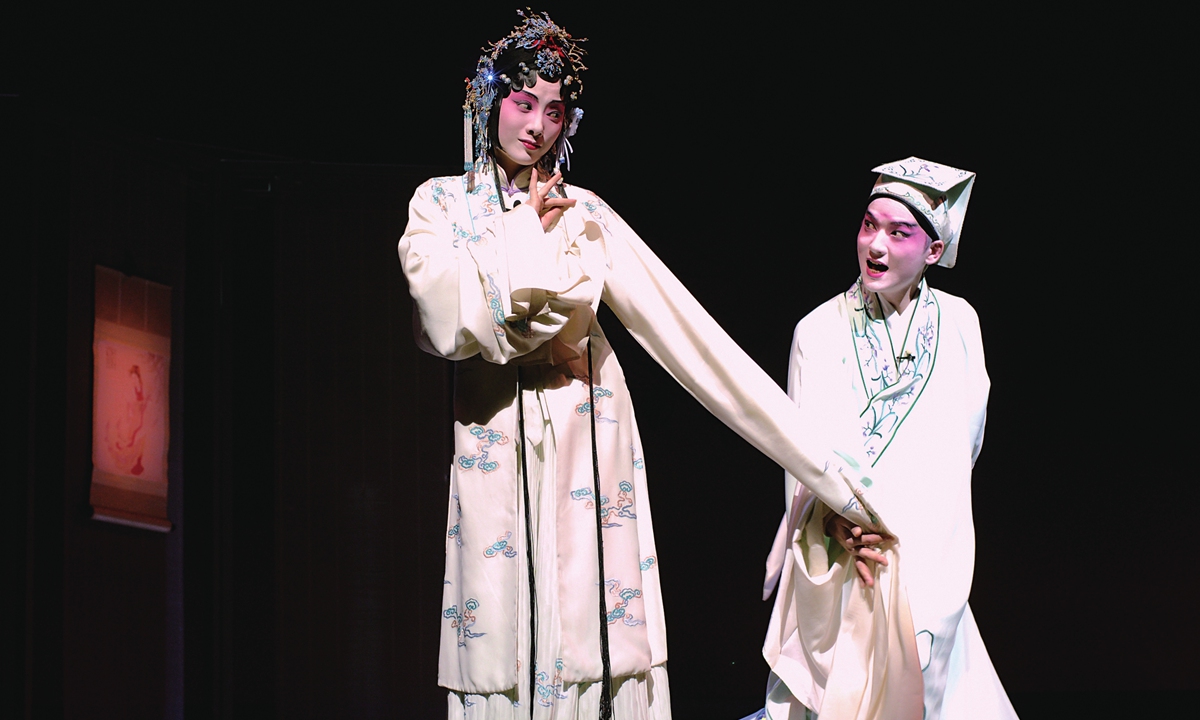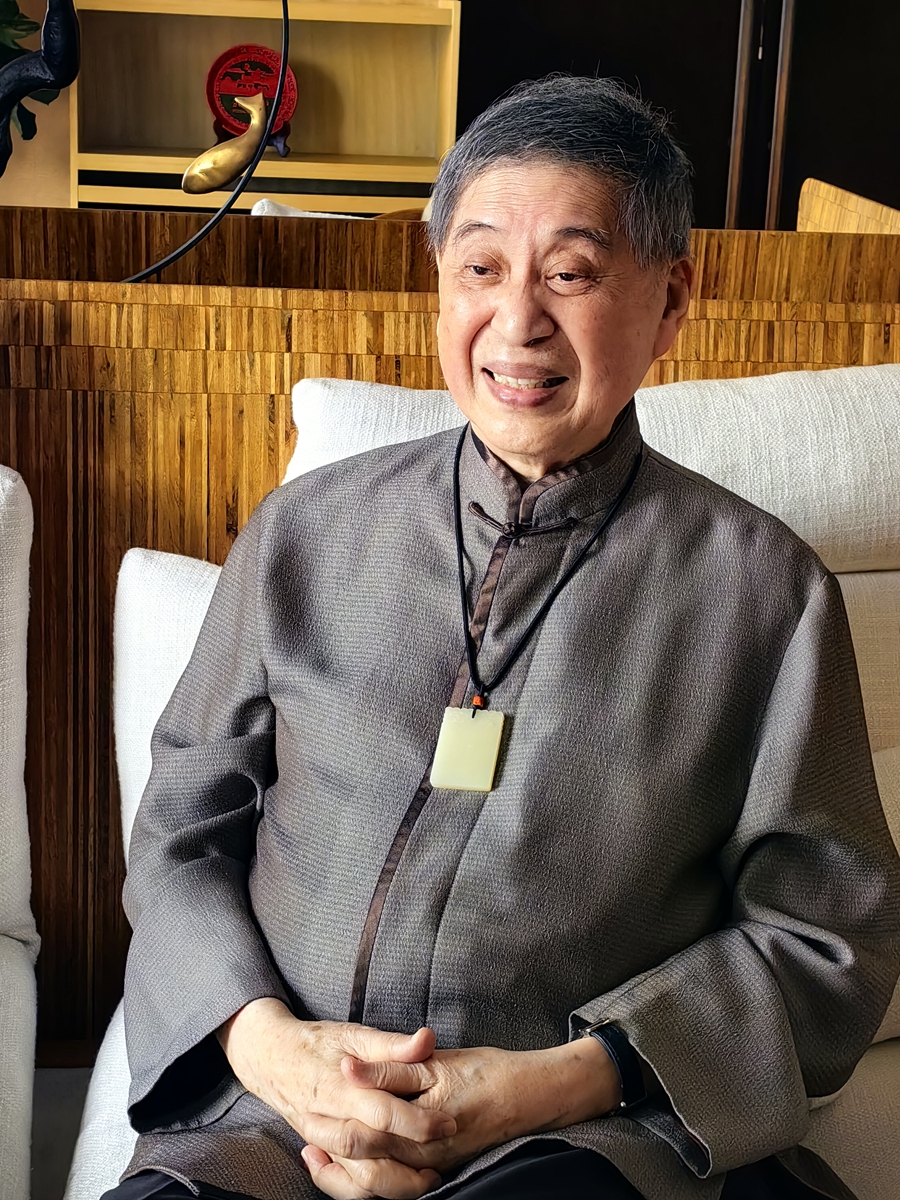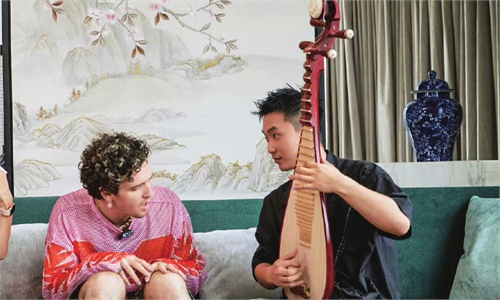ARTS / CULTURE & LEISURE
Reviving a 600-year-old art
Preserving Kunqu Opera through young generation

Promotional material for The Peony Pavilion Photo: Xu Peihong
Twenty years ago, a fresh interpretation of The Peony Pavilion, a masterpiece of Chinese Kunqu Opera, a 600-year-old Chinese opera form that combines music, poetry, elaborate costumes, and graceful movements, premiered in the island of Taiwan, creating a sensation and subsequently touring in various venues worldwide.
This was no ordinary production. Dubbed the youth edition of The Peony Pavilion, it featured young performers and targeted a young audience, aiming to breathe new life into the ancient art form.
Many young people have encountered Kunqu for the first time through this play and have since fallen in love with it, Pai Hsien-yung, the producer of the play, told the Global Times.
As the production celebrates its 20th anniversary this year, the Global Times interviewed Pai, who is also a celebrated writer. At 87, Pai remains enthusiastic when speaking about Kunqu Opera.
"I believe Kunqu is eternally youthful; otherwise, it wouldn't have been passed down through the centuries," Pai said. "I want to bring back its youthful vitality."

Pai Hsien-yung Photo: Zhang Ni/GT
Younger audiencePai's passion for reviving Kunqu began with a sense of urgency. "At that time, many of the Kunqu masters were nearing retirement, and there was a real danger that this art form would face a gap in talent and tradition," Pai recalled.
Additionally, in the early 2000s, Kunqu had an aging audience, because it seemed to primarily appeal only to older generations.
"We want to draw young audiences back to the theater by featuring young actors who resonate with them. Moreover, The Peony Pavilion is a celebration of youth, love, and life. Its love story is universal and relatable to young people both in China and abroad," said Pai.
Written by Chinese playwright Tang Xianzu (1550-1616) of the Ming Dynasty (1368-1644), The Peony Pavilion tells the story of the romance between a daughter of a wealthy official and a talented but poor young scholar. The original play consists of 55 acts, while the youth edition has been condensed to 27 acts, performed over three consecutive days for a total of 9 hours.
In 2003, a group of young actors and actresses in their 20s went through an intensive training camp to master Kunqu's complex and demanding techniques.
"The male lead practiced the 'kneeling walk' until his knees bled, and the female lead wore out over a dozen pairs of shoes during the training," Pai recounted. This rigorous preparation led to the birth of the new play.
In 2004, the opera premiered in Taipei, in the island of Taiwan, where Pai has been based for years.
In 2006, the play was performed across four University of California campuses, playing to packed houses at each stop. What surprised Pai and his team the most was the composition of the audience - 60 percent of the attendees were non-Chinese, many of whom had never heard of Kunqu before. "They stood up and applauded for over 10 minutes, something we didn't expect," Pai said.
"Kunqu portrays the deepest emotions of the Chinese people in the most beautiful way, so its aesthetics attract the young, and its emotional core moves them," Pai told the Global Times.
In today's rapidly evolving world, Pai is aware of the need for classical art forms like Kunqu to remain relevant. Recently, he opened a personal account on the lifestyle-sharing platform Xiaohongshu, where he shares his thoughts with over 95,000 followers. "I want to know what young people think about classical culture, and I want to hear their voices," said Pai.
"We have now entered the era of artificial intelligence. In this fast-changing world, it is increasingly important for young people to engage with and appreciate traditional Chinese culture. The roots of Chinese culture must be firmly established to prevent them from being led around by high technology," he said.
Urgent task
Kunqu still faces challenges in its homeland. According to Pai, over time, the number of plays that masters could teach dwindled. "The old masters once held over 600 plays in their repertoire, but only a fraction remains today. The urgent task now is to quickly preserve classic plays while the masters are still able to teach them; this is far more important than randomly creating new plays," said Pai.
Nurturing the next generation of performers to carry it forward is also of great importance. As part of this effort, the youth edition actors and actresses - now in their 40s - are passing their knowledge to younger performers, ensuring that the cycle of transmission continues.
In addition to the stage, Pai has been instrumental in promoting Kunqu within academic circles. In recent years, he has helped establish Kunqu Opera courses and heritage programs at universities such as Peking University, Soochow University, the Chinese University of Hong Kong, and Taiwan University.
Like Kunqu, many traditional Chinese operas currently face challenges in inheritance, and Pai believes that it is essential to uphold tradition while adapting to the present.
For example, the youth edition of The Peony Pavilion integrates modern stage aesthetics while respecting tradition. One guiding principle in the scriptwriting process is to only delete but not alter because Tang Xianzu's words are "too beautiful to change." The arrangement and distribution of scenes have been reorganized to ensure that the nine-hour performance remains engaging.
Pai also acknowledges the success of some modern adaptations of Chinese culture, such as the popular video game Black Myth: Wukong, which has introduced international players to Chinese mythology. However, he remains realistic about the future of Kunqu, a niche art form.
"Kunqu is one of the most refined of Chinese operas. We can't expect it to become as popular as pop music. If we can win over 10 percent of university students, I'll be satisfied," said Pai.



